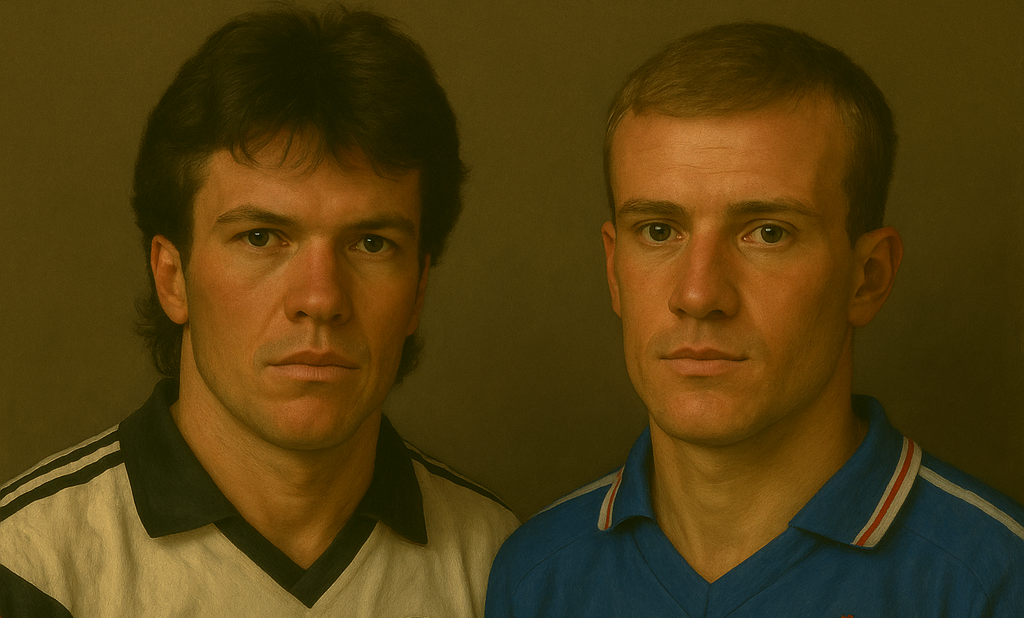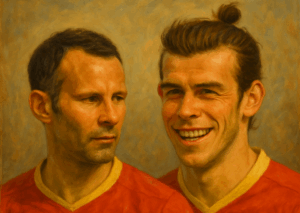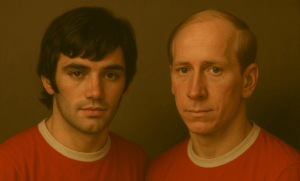
The GOAT of the World Cup-Winning Captains in Central Midfielder?
When discussing the pinnacle of football in the 1980s and 90s, the names of Lothar Matthäus and Didier Deschamps are indispensable. These two midfielders, who graced the same era, shared the same position, but their football lives followed remarkably different trajectories. One was an overwhelming ’emperor’ who dominated the field; the other was a dedicated ‘conductor’ who sacrificed for the team.
The core of this post is to explore the ‘Great Inversion’ manifested in the careers of these two legends. As a player, Matthäus was a perfect specimen who showed the peak of individual skill but repeatedly failed as a manager. In contrast, Deschamps, who called himself a ‘water carrier’ and dedicated himself to the team, became one of only three men in history to win the World Cup as both a player and a manager. Why did their fates diverge so dramatically? The journey to answer this question leads us to a deep contemplation of the philosophy of success, beyond just the aesthetics of football.
1. A Comparison of Their Playing Careers: The Field’s Ruler vs. The Tactical Conductor
Club and National Team Career Statistics
The career statistics of the two players starkly show the difference in their roles.
| Category | Lothar Matthäus | Didier Deschamps |
|---|---|---|
| Total Appearances | 785 | 562 |
| Total Goals | 204 | 21 |
| International Caps | 150 | 103 |
| International Goals | 23 | 4 |
Matthäus’s phenomenal goal-scoring record clearly shows he was a match-winner who could dominate a game individually, while Deschamps’s stats indicate he was the foundation responsible for the team’s balance and stability.
Major Trophies and Individual Awards
Both players boast illustrious trophy cabinets, but the difference in individual awards is decisive.
| Trophy | Lothar Matthäus | Didier Deschamps |
|---|---|---|
| World Cup | 1 | 1 |
| European Championship | 1 | 1 |
| UEFA Champions League | 0 | 2 |
| Domestic League Titles | 8 (7 Bundesliga, 1 Serie A) | 5 (3 Serie A, 2 Ligue 1) |
| Ballon d’Or | 1 (1990) | 0 |
| FIFA World Player of the Year | 1 (1991) | 0 |
Matthäus was recognized as the best player of his time, winning the Ballon d’Or in 1990 and the FIFA World Player of the Year in 1991. This fact clearly shows that Matthäus was a cut above Deschamps in terms of individual skill as a player.
2. In-Depth Analysis of Playing Style: ‘Der Panzer’ and the ‘Water Carrier’
Lothar Matthäus: The Complete Box-to-Box Midfielder
Matthäus was a powerful and perfect midfielder, as his nickname ‘Der Panzer’ (The Tank) suggests. He had it all: tireless stamina, a powerful long-range shot, sharp passing, and tackles that overwhelmed opponents. In the latter part of his career, he transformed into an intelligent sweeper, showcasing his incredible football intelligence and versatility.
Diego Maradona: “He is the best rival I’ve ever had.”
Matthäus’s football intelligence was geared towards optimizing his ‘individual’ play. He was an instinctive genius who read the game and found solutions on his own, but this was a realm difficult to impart to others.
Didier Deschamps: The Intelligent Defensive Midfielder
Deschamps’s nickname was ‘le porteur d’eau’ (the water carrier). Although it was a term used by Eric Cantona to disparage him, Deschamps turned it into his identity and a badge of honor. His play was far from flashy. Instead, he laid a stable foundation for the team’s creative star players to shine, using his tactical intelligence, relentless effort, and outstanding ball-winning ability.
Deschamps’s playing career was like a long apprenticeship for becoming a manager. He was practically a coach on the field, possessing a ‘systemic intelligence’ that understood how all the components of a team fit together.
3. A Comparison of Their Managerial Careers: Two Divergent Second Acts
Didier Deschamps: The Manager Who Became Synonymous with Victory
Deschamps’s managerial career has been a string of successes. He led AS Monaco to a Champions League final, brought Juventus back to Serie A, and guided Marseille to a league title. And finally, as the manager of the French national team, he won the 2018 World Cup, becoming the third person in history to win the tournament as both a player and a manager. His coaching philosophy is closer to pragmatism, prioritizing team balance and defensive stability over beautiful football.
Didier Deschamps’s Major Managerial Honors
| Competition | Times Won |
|---|---|
| FIFA World Cup | 1 (2018) |
| UEFA Nations League | 1 (2021) |
| Ligue 1 (France) | 1 (2009-10) |
| Coupe de la Ligue | 4 |
| Serie B (Italy) | 1 (2006-07) |
Lothar Matthäus: An Unfulfilled Ambition
In contrast, Matthäus’s managerial career has been unstable and fraught with difficulty. He coached various clubs and national teams in several countries, but most of his tenures were short and controversial.
The overwhelming confidence and dominance from his playing days became a poison once he became a manager. He couldn’t understand players with different abilities than his own and had a tendency to publicly blame others rather than unite the team. The strong personality that made him a great player became the biggest factor in his failure as a manager.
4. Leadership and Legacy: The Two Legends from a 2025 Perspective
The Difference in Leadership Styles
- Matthäus’s leadership was a typical ‘dominant’ style. He led the team with his overwhelming skill and charisma, a ‘follow me’ approach.
- Deschamps’s leadership is closer to a ‘collaborative’ and ‘strategic’ style. He focused on balancing the team and creating synergy by maximizing the strengths of each individual player, a ‘let’s go together’ approach.
Footprints Left on Football History
- Lothar Matthäus’s legacy will be remembered as one of the greatest and most complete midfielders in football history. However, his managerial career left the lesson that a great player does not necessarily become a great manager.
- Didier Deschamps’s legacy is more unique and profound. He is a historic figure who lifted the World Cup as both a player and a manager, defining French football across two different eras. His name has become synonymous with ‘victory’ itself.
Conclusion: Who Was Greater? The Unending Debate
If the measure of greatness is the highest peak of skill an individual can reach, the overwhelming talent that completely dominates the field, then the honor should go to the Ballon d’Or winner, Lothar Matthäus.
However, if greatness is a sustained leadership and influence that goes beyond an individual’s success to lead a team to the top and conquer the world twice in entirely different roles as a player and a manager, then that glory rightfully belongs to Didier Deschamps.
Ultimately, their comparison poses a question to us: What do you value most in football? The wondrous moments created by a single genius, or the perfect harmony and victory forged by a single team? This unending debate…




